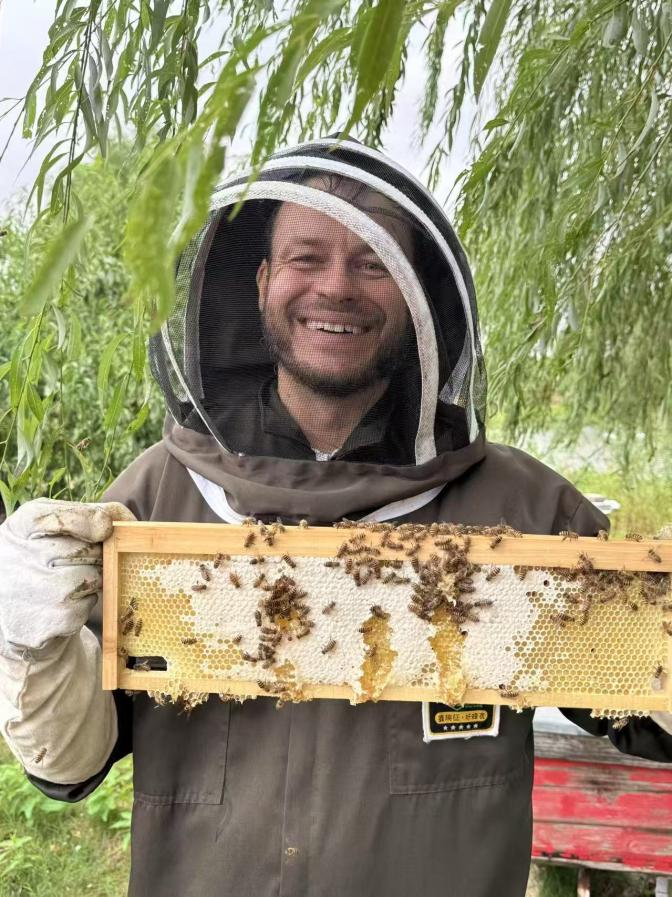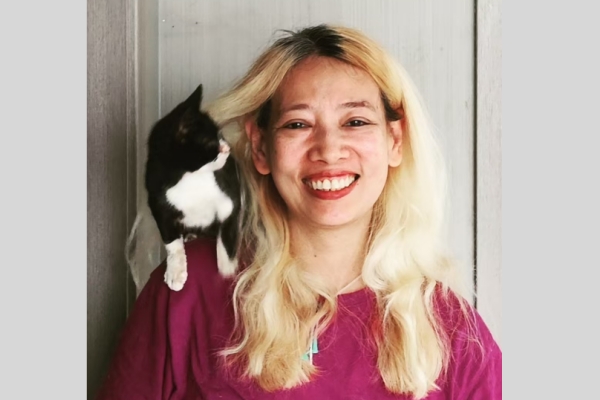Buzzing for biodiversity: An Italian beekeeper's Shanghai mission
Shanghai, a metropolis known for its towering skyscrapers and bustling streets, might seem an unlikely place for beekeeping. Yet, Marco Sentinelli, an Italian entrepreneur, is determined to make it happen, one hive at a time.
Driven by a passion for the vital pollinators and a desire to give back to the city he now calls home, Marco is committed to teaching more people about the importance of bees to the environment.
Marco is now leading an initiative called "Urban Bees Shanghai", which is dedicated to enhancing biodiversity by supporting native plant pollination and raising public awareness of beekeeping.
But his relationship with bees stretches back much further, to his days in Italy over two decades ago.
"I first became a beekeeper when the fruit trees in my orchard were not producing anything," he said, standing beside a cluster of hives on a farm in Minhang district.
"Then I realized they were not producing anything because there were no bees in the area."
Realizing the absence of bees was to blame for the fruit trees' infertility, Marco delved into apiculture. Soon, he was captivated by this "fascinating" species.
"They are an animal that really found their place in the world. They are the pollination heroes for everyone."
Upon moving to Shanghai seven years ago for business reasons, Marco initially thought his beekeeping days were over. However, in 2023, he felt the pull to return to his beloved hobby, starting with two colonies of local bees on a farm in Minhang district.

Before long, the local government came to ask him to help with pollination services, and some of his friends also brought their children to visit the farm.
"There is clearly a need for the public to better understand the role of bees, considering that bees are disappearing across the world, even faster in China."
In 2024, Marco launched a non-profit volunteer organization called "Urban Bees Shanghai", which, in collaboration with universities and local governments, trains volunteers to manage beehives in communities across the city.
"Not only in Shanghai, but also around the world, beekeepers are aging, and it's important to draw young people to the trade," said Marco. He mentioned the term "beekeeping age", a tongue-in-cheek way to refer to the appeal of mature men in their 40s and 50s. However, this also reflects the harsh reality of a lack of young successors in the beekeeping trade.
On weekends and holidays, the UBS hosts community activities, inviting families to get up close with bees and teaching volunteers beekeeping skills.
The project now manages 20 beehives across the city and has attracted about 2,000 followers, many of them young people who want to do beekeeping purely out of interest.
On April 22, the city's first community-led beehive initiative was launched in a residential block in Changning district.
Speaking of the challenges facing urban beekeeping, Marco said the reasons lie in the rapid expansion of cities and the public's lack of awareness of the importance of bees.
He said, for many people, the first thought that comes to mind when they think of bees is that they sting. However, most artificially raised bees are gentle and rarely attack humans unprovoked.
During his seven years in Shanghai, Marco witnessed the city's expansion first-hand. Although there were many green parks, the high foot traffic made it increasingly difficult to find suitable spots for beehives.
According to the Italian, in urban areas, rooftop terraces of high-rise buildings are suitable locations for beehives, as they are away from crowds.
However, placing beehives in these places require support from the government and the public.
Professor Tang Liang, an associate professor at the School of Life Sciences at Shanghai Normal University, told Xinmin Evening News that in recent years, with the improvement of Shanghai's environment, the population of wild Chinese honeybees has begun to recover.
These bees are more effective at pollinating certain native plants than Italian honeybees. However, the problem is that these small creatures are highly vulnerable and can easily be "wiped out", said Tang.
Additionally, since many residents fear all bees, wild honeybee nests are often mistaken for wasp nests and completely removed.
To help more people understand the importance of bees, Marco is advocating for policy changes that would allow for responsible beekeeping within the city.
Marco points out the need for more specific regulations, similar to those in Europe that include guidelines such as the distances you have to keep between beehives and the population.
He has already taken the initiative to educate local fire stations on safe bee removal, in the hopes of saving local colonies. So far, he has rescued six or seven colonies.
Marco envisions a greener, more biodiverse Shanghai. "If you place beehives in a farm, you can harvest 10 to 20 times more depending on the culture," he said.
"If we scale this into our city in Shanghai, we can only imagine how many more flowers and plants we can have."
He hopes to see beekeeping courses become mandatory at universities and high schools, fostering a deeper understanding of the importance of bees and environmental stewardship for Shanghai's future.
If you are interested in beekeeping and want to join Marco Sentinelli's volunteer beekeeping service, you can follow the WeChat account "Urban Bees Shanghai".


